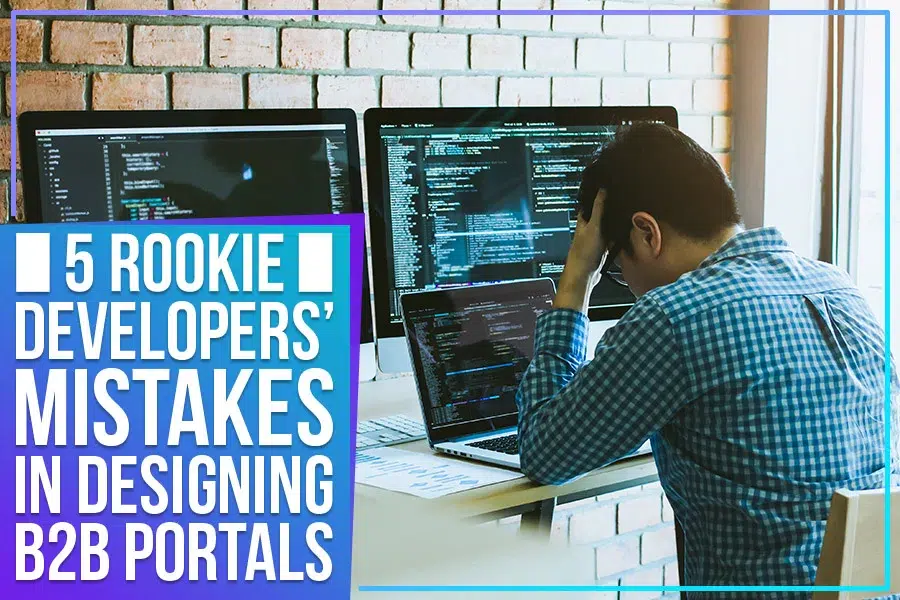B2B portals are digital platforms where companies interact and conduct transactions with each other. Think of them as virtual hubs that facilitate the exchange of information, products, and services among businesses. These portals serve as bridges between companies in various industries, allowing them to collaborate, negotiate, and conduct business affairs online.
These portals simplify complex processes, enhance communication, and streamline transactions, boosting efficiency and productivity. According to research, most B2B transactions occur online using websites/portals or email.
For instance, in the manufacturing industry, B2B portals enable the seamless flow of raw materials, product specifications, and manufacturing schedules between suppliers and manufacturers. In healthcare, these portals facilitate the secure exchange of patient data and medical records among hospitals, clinics, and insurers. In the financial sector, they enable swift and secure transactions between banks, investment firms, and businesses.
According to research, most B2B transactions occur online using websites/portals or email. A complicated navigation experience or cluttered dashboards can decrease customer retention on your portal.
How do you ensure your portal hits the target and generates the expected results? By trusting professionals to design B2B portals! In this blog post, experts at AppsTru reveal the secrets of designing B2B portals and common mistakes rookie developers make when creating one.
Also Read – Key Benefits of Custom Mobile App Development for Businesses
Common B2B Portal Design Mistakes
Here’s a list of common rookie mistakes when designing B2B portals.
1. Neglecting User-Centric Design
One typical pitfall rookie developers stumble into when crafting B2B portals is overlooking the importance of user-centric design. In their eagerness to create a visually appealing interface, they may forget that these portals are tools for businesses to accomplish specific tasks efficiently. User-friendliness and intuitive navigation should be top priorities. Failure to consider the end-users’ needs and preferences can result in frustration, decreased productivity, and missed opportunities.
2. Underestimating Security Measures
B2B portals often handle sensitive business data, making security a paramount concern. Rookie developers might underestimate the importance of robust security measures. Inadequate encryption, weak authentication protocols, or insufficient data protection can expose businesses to severe risks. Ensuring the highest level of security is not a feature but a necessity in B2B portal design.
3. Ignoring Scalability
As businesses grow, their demands on B2B portals grow as well. One frequent misstep rookie developers make is designing portals that lack scalability. Businesses encounter bottlenecks and reduced performance when portals can’t accommodate increasing user loads or expanding data. A successful B2B portal should be built with scalability in mind and capable of adapting to evolving business requirements.
4. Overlooking Integration Capabilities
B2B portals often need to integrate with various other systems and software used by businesses. Neglecting integration capabilities can hinder the portal’s functionality. Rookie developers might not foresee the importance of smooth data exchange between the portal and existing enterprise solutions. An inability to integrate effectively can lead to inefficiencies and a disjointed user experience.
5. Neglecting Mobile Responsiveness
In the age of mobile devices, overlooking mobile responsiveness is a significant oversight. B2B portal users frequently access these platforms from smartphones and tablets. Rookie developers might design portals that work well on desktops but struggle on smaller screens. Neglecting mobile responsiveness limits accessibility and can frustrate users who need to access the portal on the go.
Hiring a Professional Web Development Agency to Design B2B Portals
While rookie developers bring enthusiasm and fresh ideas to B2B portal design, avoiding these common mistakes is essential. Choosing a professional web development agency to design B2B portals is a critical decision that can significantly impact your business’s efficiency and success. Here’s a step-by-step guide to help you make the right choice:
1. Define Your Objectives
Outline your specific goals and objectives for the B2B portal. Determine what functions, features, and user experiences are essential for your business.
2. Expertise Matters
Look for agencies with a proven track record in B2B portal development. Check their portfolio for similar projects and assess their expertise in handling complex business solutions.
3. Technology Proficiency
Ensure the agency is proficient in the latest web development technologies and frameworks. A modern and scalable technology stack is essential for long-term success.
4. Client References
Request client references or case studies to gain insights into the agency’s performance, reliability, and ability to meet deadlines.
5. Customization Capabilities
A professional agency should offer tailored solutions that align with your business needs. Avoid agencies that offer one-size-fits-all templates.
6. Security Focus
Security is paramount in B2B portals. Inquire about the agency’s security measures and their experience in handling sensitive business data.
7. Scalability and Integration
Ensure the agency can build a portal that can scale as your business grows and seamlessly integrate with your existing systems.
8. Mobile Responsiveness
Today’s business professionals are often on the move. Your portal must be mobile-responsive for easy access and usability.
9. Communication and Collaboration
A professional agency should have clear communication channels and a collaborative approach. Effective communication is vital to project success.
10. Support and Maintenance
Inquire about post-launch support and maintenance services. A reliable agency will provide ongoing support to address issues and updates.
11. Budget Transparency
Ensure the agency is transparent about costs and provides a detailed breakdown of the project’s expenses.
12. Compliance and Regulations
If your industry has specific regulations, verify that the agency can build a portal that complies with these standards.
13. Reviews and Feedback
Check online reviews and seek feedback from previous clients to gauge the agency’s reputation and client satisfaction.
14. Long-Term Partnership
Choose an agency that views the project as a long-term partnership committed to your success beyond the initial launch.
If you’re looking for a professional web development agency to design your business portal, remember the above pointers to shortlist potential candidates. AppsTru helps develop online platforms that are engaging and easy to access for all stakeholders. Our intuitive design and customized development ensure your portal effectively showcases your brand and encourages visitors to explore.
Get started today to get a customized B2B portal that fits your needs.






